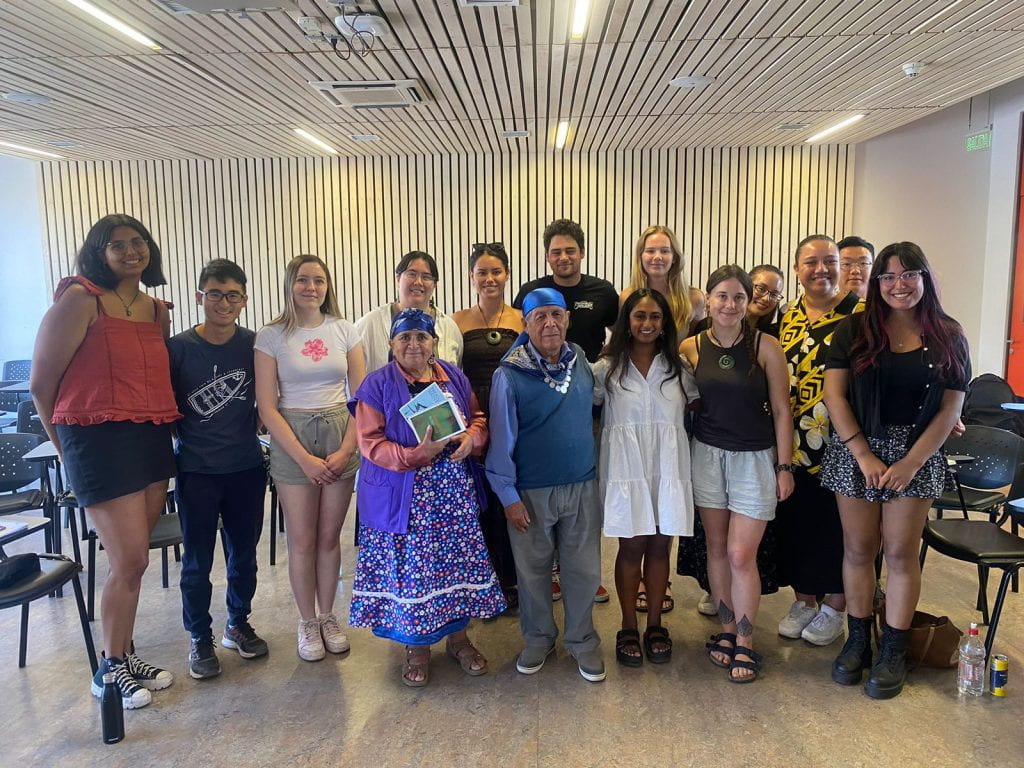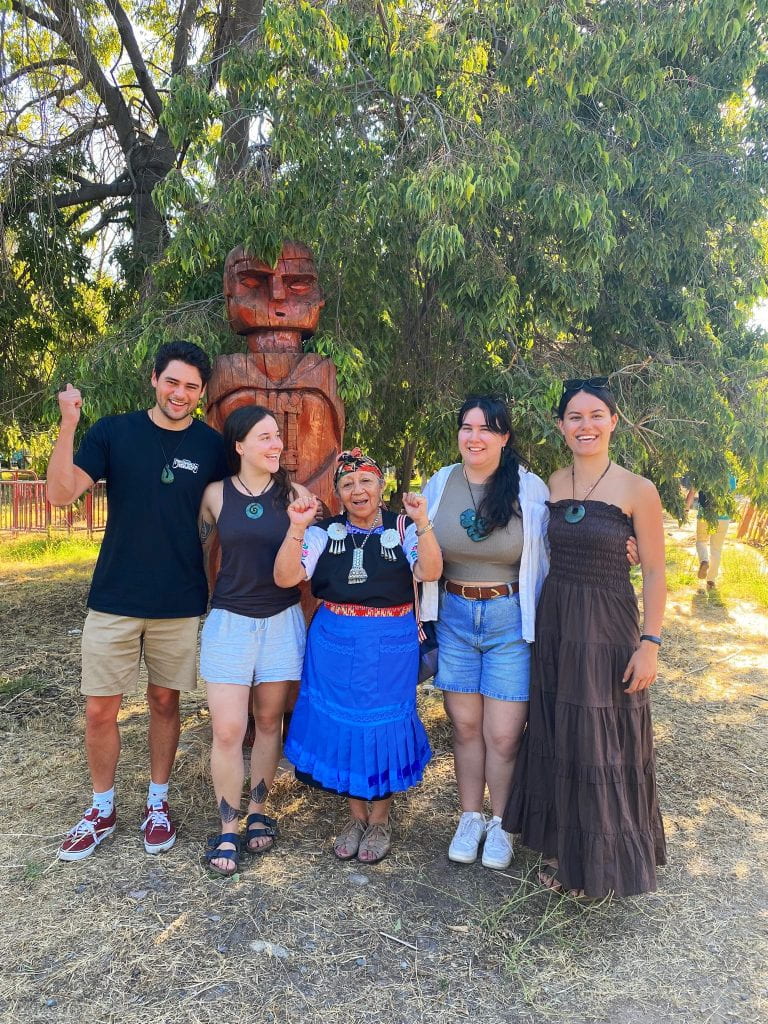I acknowledge that the land I stand on is the rightful territory of the Mapuche people. I recognise my position as manuhiri (a visitor) on this land, and write with the intention of honouring the tikanga (protocols) of the Mapuche people. I further recognise the long-lasting effects of colonisation for all Indigenous groups in Chile, and advocate for these groups to have their rightful autonomy over their territories.
Mari mari kom pu che (hello everyone),
In Mapuche culture, it is customary to turn one’s head in the direction of the Andes mountain range, and honour the long line of ancestors that preceded us. After the most transformative week of Indigenous learnings and connection, looking to the Andes invokes a new level of awe and appreciation. Within and next to their dominance over seven Latin American countries lies some of the most diverse, resilient and pioneering Indigenous cultures. These mountains have housed the growth of civilisations over centuries, providing sustenance and support to its rightful inhabitants.
However, the Andes have also been subject to the devastating effects of colonisation. Lives, languages and land have been taken for hundreds of years, Indigenous peoples falling victim to the forced dominance of Western societies. Despite a painful history of colonisation, this has not stopped the resilience and might of the Andes passionately manifesting itself into its descendants today. This became abundantly clear in our first Indigenous field-visit to a Ruka (Mapuche house), where the infectiousness of Indigenous energy and strength immediately embraced us. Aligning with Mapuche tikanga, we first offered water and wheat to the ground, where the Mapu (earth) is fed before us. Upon entering the Ruca, photos of ancestors and the community lined the walls, watching over us as we learnt together, shared food together, and marvelled at the beauty of Mapuche traditions together. Out of all moments thus far in Santiago, this is the one where I felt most at home — despite our geographical and historical differences, honouring land and ancestry as an integral part of our being traverses Indigenous international barriers. The feeling of warmth and protection resembled that of a marae back home, where I could disconnect from the fast-paced nature of a Westernised society.



Out of all the lectures and seminars of this trip, there was none quite like the Mapuche medicine seminar. Manuel, a Machi (esteemed healer), was accompanied by his wife Maria, a Lawentuchefe (Indigenous nurse). At the core of Mapuche healing is the validation of mind, body and soul — ‘am’ is the soul that inhabits a person upon conception, and inhabits the body for its entire lifetime. The am of Manuel and Maria generated profound awe and gratitude in all of us, the room carrying an indescribable energy. Being a Machi and a Lawentuchefe is nacen (granted at birth), where the calling in the Machi’s case manifests itself in dreams. While at Catholic school as a young boy, Manuel recalled having dreams of connecting with his ancestors and the Universe. Facing a religious and cultural dilemma, Manuel asked how he would ever teach and practice healing without a bible. Encouraged to look to nature, Manuel was told in his dream —
“That is your bible.”
In that one line, Manuel summarised what it is to live Indigenous. The land feeds, houses and heals us, and is hailed as the ultimate figure in our existence. For Manuel, everything from the land is lawen — be it tangible or intangible, every component of the Universe carries an energy, and thus can be harnessed for healing. The intrinsic relationship that Indigenous share with te taiao (the world) is why Manuel stresses the importance of simultaneously healing the mind, body and soul — our being cannot be perceived as an anatomical machine, and should not only be treated at the cellular level.
These ideologies of mind, body, spirit and land being intrinsically linked are relatively new in the Western medicine scene. Terminology like ‘biopsychosocial’ and ‘holistic’ are still establishing themselves in medical texts and research, and often are not actualised in practice. These ‘novel’ concepts in Western medicine are ways of being for Indigenous — the Western world has so much to learn from centuries of Indigenous knowledge.

Following Manuel and Maria’s kōrero, our visit to Salud La Pintana illustrated the enacting of Indigenous care in an urban setting. With Indigenous leadership, practitioners and lawen, the clinic works to treat the complex and holistic nature of wellbeing from a Mapuche lens. Juanita, an Indigenous health activist, stressed the importance of Western and Indigenous medicine collaboration, where both are used circumstantially. As an Indigenous person in Medical school, I was deeply moved by the utilisation of traditional practices to remedy complex medical problems. I am motivated more than ever to learn about and practise Rongoā Māori (Māori healing) — the science and intuition of my tūpuna will forever have a place in the modern medical scene.
The whakaaro from week three of PMSLA has had profound impacts on my personal and academic life, where my understanding of what it means to be Indigenous has exponentially grown. As Indigenous, our advocacy must extend beyond the realities and injustices of our own colonial histories. It is vital that we advocate for Indigenous struggles abroad, as all Indigenous voices must be amplified and projected to the world.


In the words of Juanita in the Ruka, “There are a lot of sick people that come through here, but they are all fighters.”
I tautoko her use of the word ‘fighters’. In light of the current political and social climate for Indigenous in Aotearoa, it is a poignant but necessary reminder of what we must be for our tūpuna.
Chantumay (thank you),
Charlotte